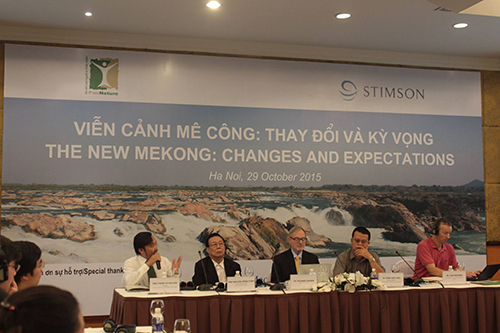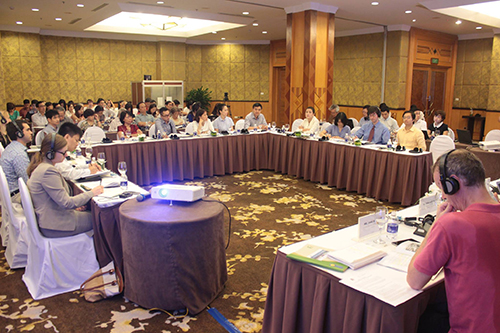Vietnam is recognized as one of the world's most biodiverse…

The New Mekong: Changes and Expectations
On Thursday, October 29, 2015, stakeholders and experts on hydropower development and water resources in the Lower Mekong River Basin participated in a panel discussion entitled “The New Mekong: Changes and Expectations” in Ha Noi. Panelists included Mr. Trinh Le Nguyen (People and Nature Reconciliation/PanNature), Mr. Nguyen Hong Toan (former Vietnam National Mekong Committee Secretary-General), Dr. Richard Cronin (The Stimson Center), Dr. Tran Viet Thai (Institute for Foreign Policy and Strategic Studies), and Mr. Jake Brunner (IUCN Vietnam). A few key themes and topics were reiterated throughout the discussion:
- The construction of mainstream dams on the Mekong River pose significant environmental and social impacts for riparian communities in Cambodia and Vietnam. Vietnam National Mekong Committee’s Mekong Delta Study – set to be released in December 2015 – preliminarily predicted that hydropower dams will eliminate approximately 50 percent of fish catches in the region, which poses food security, public health, and economic crises in both Cambodia and Vietnam.
- There is a need for institutional strengthening of the Mekong River Commission, and panelists noted the important role it should play in relation to hydropower dam approval and construction.
- Jake Brunner of the IUCN noted that the United Nations Watercourses Convention, which entered into force in August 2014 after Vietnam was the 35th country to ratify the convention in May 2014, could be utilized to supplement and fill the gaps of the 1995 Mekong Agreement. Since the Mekong Agreement is not a legally biding agreement, the UN Watercourses Convention is one avenue for strengthening the Mekong Agreement and the Mekong River Commission without altering current laws.
- The Mekong Agreement is outdated and needs to be updated in order to effectively tackle the current transboundary challenges posed by hydropower dams. However, since it takes much political will to drastically modify the Mekong Agreement, a number of experts – including Mr. Nguyen Hong Toan – pointed out the potential risk that some countries might not want to participate in strengthening the agreement and regional organizations.
- For Laos, electricity generation from hydropower dams is seen as a means of economic development. While stakeholders, experts, and government officials recognize Laos’ reasoning behind constructing hydropower dams, Dr. Richard Cronin noted that if all of the eleven proposed dams were constructed, the dams would only produce 6 to 8 percent of the total electricity needs of the entire Lower Mekong Basin by 2025. Many experts assert that given the current situation, mainstream dams will be built along the Lower Mekong River. However, the challenge now is to choose the dams that can maximize power production and minimize negative social and environmental impacts.
- Panelists including Dr. Cronin and Mr. Brunner suggest that it is necessary to have alternative solutions to support and facilitate Laos’ economic growth and energy security. For example, the international community and countries in the basin could support Laos in establishing a national power grid. Vietnam, in particular, could assist Laos given Vietnam’s successful experience in rural electrification program.
- Science is especially crucial in informing political decisions and Mekong Region studies, such as environmental impact assessments. Panelists, including Dr. Richard Cronin and Dr. Tran Viet Thai, pushed for the creation of a scientifically-based Mekong Standards for transboundary impactful projects.
Some pictures from the Discussion:


Dr. Richard Cronin
Mr. Jake Brunner
Dr. Tran Viet Thai:
News on the event:



